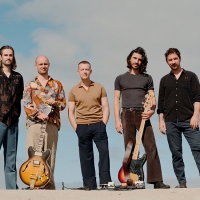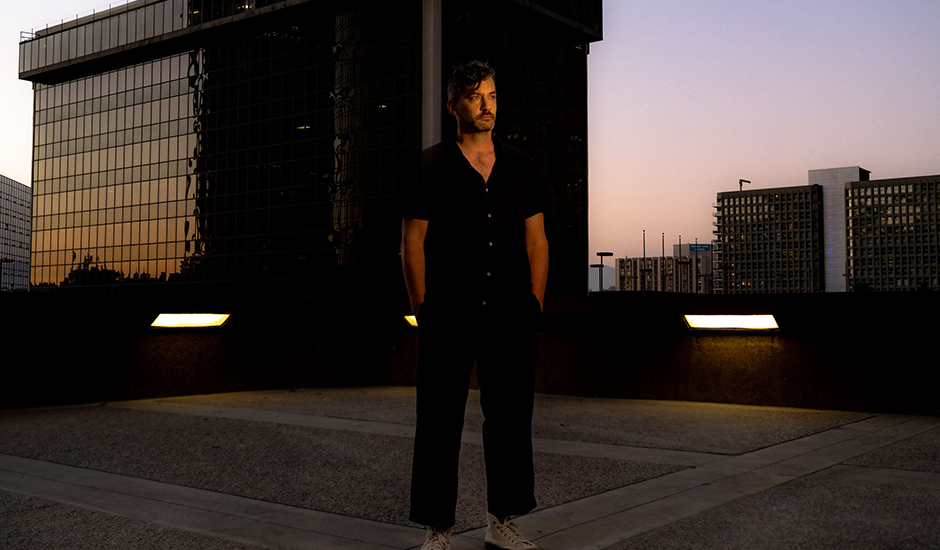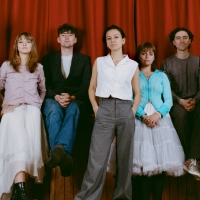 Mildlife: Turning a destabilising year into their most successful yetAmongst Melbourne’s 2021 lockdown, we speak to Mildlife about turning tour disappointments into their new film, Live from South Channel Island.
Mildlife: Turning a destabilising year into their most successful yetAmongst Melbourne’s 2021 lockdown, we speak to Mildlife about turning tour disappointments into their new film, Live from South Channel Island.

Bonobo’s search for excitement: “It gave me a sense of perspective.”
With his newly-minted seventh album, Simon Green creates a masterpiece that flirts amongst dance music’s many dynamics and contrasts.
Simon Green is constantly on the search for something to be excited about.
As the world-renowned producer Bonobo, this search is embedded amongst the dynamics of his many, genre-defining records. His last album, 2017’s GRAMMY-nominated Migration, was a thrilling masterclass in Bonobo’s production prowess, elevating the musician to the highest pedestal of dance music’s modern-day pioneers. Similarly, ‘excitement’ is a core pillar of OUTLIER, a series of touring events turned into a record label that launched last year, via a pair of collaborations alongside Totally Enormous Extinct Dinosaurs (with more to come).
Across the last few years, however, Simon Green has come to search for excitement in realms far removed from the club culture that has long provided his thrills. One source has been found amongst the picturesque nature that would often follow him on tour; the musician losing himself amongst the “places that were alien and unique and awe-inspiring” while touring Migration prior to the pandemic. Even when his extensive album tour came to a close, his natural surroundings - and the isolation found within them - remained a source of comfort and escapism; somewhere to hide as the US - where he’s been living for the last few years - battled everything from a controversy-fuelled election to a global pandemic.
Unsurprisingly so, Bonobo’s music has always held a close relationship with location and nature. His name is shared with that of an endangered great ape, and his music intertwines itself with his changing environment on nearly every level; each roll-out serving as a time capsule to the beauty amongst him. Black Sands’ infamous front sleeve is a photograph of Northern England’s Derwentwater, while 2017’s Bambro Koyo Ganda music video manipulated the world’s constant cycle - both natural and man-made. There are also the less visual examples too, such as the intersections of British culture explored on The North Borders, his 2013 album considered somewhat of a pinnacle in modern electronic music.
With that said, however, these associations with nature almost always co-exist with a near-otherwordly musical backing, as the synthetics of digital production overpower and out-complex the often more subtle and quiet inclusions of nature that sprinkle throughout his discography. On his seventh album Fragments, however, a stark decision to emphasise music’s more organic beauty means that these flutters of his surroundings seep into the forefront of his sound, and the end result - out now via Ninja Tune - is Bonobo’s most remarkable work to date.

Fragments is an album centred in the contrasts and juxtapositions of Bonobo’s sound, containing both his most magically intimate and heavy-handedly hard-hitting work to date. It’s an album that ripples from the inspiration Simon Green finds in both the arching treetops and the UK club culture he’s romanticised since moving to the US; an album capable of showcasing Bonobo at his darkest and yet, also his most stunning. At times, Fragments’ artistic juxtapositions venture into their most extreme to date, capturing the multi-dimensional complexities of Bonobo’s sound better than any album he’s released beforehand.
On one hand, you have singles that relish in the beauty that’s long-expected of Bonobo’s soundscapes; the intricate, finely-detailed subtlety that’s been distinctive to his work even though its shift from jazzier electronica to one more pop-centric. The Jamila Woods-assisted album centrepiece Tides is one such example, welcoming a tapestry of cycling melodies that navigate the swelling poetry of the Chicago-based breakthrough. His unexpected collaboration with Joji is another example; the ballad - titled From You - drawing inspiration from the beauty that occurs in a crowd moving as one, converting the euphoria of club culture into its near-opposite: melancholy.
Yet, in Fragments’ more explosive moments, Bonobo isn’t creating music inspired by club culture as much as he is creating music that feels reminiscent of its next paths, capturing the chaos of cramped dancefloors and the harmonies that sweep amongst dancing feet. Otomo, for example, turns a Bulgarian choir into Bonobo’s heaviest production to date, assisted by UK dance music breakthrough O’Flynn. Sapien - situated towards the album’s end - presents another example, born from obsessively listening into British DJ mixes to piece together the new sounds that hadn’t yet travelled across to the US through club culture’s natural migrations.
In many ways, Fragments is laden with the complexities that have long detailed Bonobo’s discography, yet they’re elevated to an entirely new level; strengthened by the continued evolution and growth that follows Bonobo’s twisting musical and personal journeys. Fragments is a reminder of the power that can be captured within the art of these journeys - and it’s clear that Bonobo’s journey isn’t even close to reaching its pinnacle moment.
How are you? How has everything been going?
It’s been good, man. I’m in LA at the moment, about to leave for London to start rehearsals for the next few weeks ahead of the tour.
When was the last time you made it over to the UK?
I actually managed to get out there last month to sort my VISA out, because I was sort of landlocked in the US for the last few years like a lot of people were.
Was it nice to venture back?
It was actually! I’ve been kind of looking down on London for the last year thinking that it’s not a good vibe there right now, but it felt like everything was coming back. It felt exciting to be there.
Migration came out five years ago, and from an outsider’s perspective, that seemed like the most intensive release you’d ever put out, especially factoring in touring. When that album and tour cycle came to a finish, how were you feeling creatively?
It really hit me in the middle of it all. Looking back, I feel like 2017 was really fun and then suddenly, it wasn’t - everything seemed to suddenly fall apart. It was a weird year as well, especially in America, and I felt a bit like “whoa, I don’t know what the fuck is going on.”
At the time, balancing that big tour schedule while having this existential fucking reckoning was a lot. In the end, I think it worked itself out though; by the end of it I was in a much better place and I decided that I would take time off for the first time because in previous album cycles I had just sort of gone straight to work towards finishing another record and touring another record and it never really stopped. I decided to take off 2018 before getting back into it, and then toured for a bit longer, then took January and February 2020 off as a bit of a treat, and then COVID happened in March and kind of messed everything up again.
When did the beginning of Fragments begin to piece together?
I never really stopped honestly, I was just noodling around with stuff the whole time. So I guess the process of one recording starting happens almost immediately when the last one is finished. In terms of really getting into the meat of it though, there was a big period towards the end of 2019 leading into 2020. Then, I think that like a lot of people, that whole momentum just ground to a halt, and that’s the paradox of having so much time but nothing really to do you know? There were no experiences to reflect off, but at that point, the album had already come along.
When you began to dig into the idea of a new album, was there anything you were aiming to achieve?
Honestly, I feel like just reflecting on what I’m listening to and what’s around, and I think everything was kind of evolving at that point. So I was just trying to document where my head was most of the time, while also trying to be excited about what’s happening and trying to reflect that into what I’m creating. Trying to keep things really exciting for myself is a big thing.
Generally speaking, I feel like in terms of what an album actually is happens towards the end, rather than at the start with a broad concept. You just make tunes until something starts to take shape, and then you think “well, maybe this is the vibe of this album then.”
From what you’ve said, it sounds like you were quite heavily involved in the songwriting process when the pandemic began to take effect. Did your relationship with the songwriting and the material you were writing shift at all?
I think it really slowed down more than anything. There are moments of the… frustrations of being in a pandemic, because this is certainly a pandemic record, but I think when things go back no one will want to think about that. I think there are definitely moments of that “fuck this” type of aggression and then they allow those moments of quiet, dynamic acceptance.
I feel like that’s where I was, just like everyone else; waves of frustration followed by that feeling of “well here we are, what can you do about it?”.
I know a lot of the time you write music, it’s done on the road, but obviously, that couldn’t happen with this record because there was no touring. How did your process of writing music change because of that?
I really had to learn how to find experiences elsewhere. It’s not necessarily just good experiences - anything can be inspiring - but I had to learn how to find something that was valid to bounce off, which I usually find on the road. I really found that just removing myself from the context of the studio and going on road trips and getting out was the only thing I could really do. I’d just make little drives about a half-hour out from LA and get into the mountains and away from the coast. I’d do a lot of that; I’d make trips and try to take music outside of the studio.
How do you feel like that changed the album’s sound?
I don’t know, I think it just gave me a sense of perspective. I don’t know if it really affected the sound as much, it was more about hearing stuff for the first time again, or hearing stuff from the perspective of not being in the same room as it was made, and so understanding what needed to happen for it to be finished. I think that was the most beneficial part of doing that.

You mentioned earlier that you purposefully gave yourself time off, and I know that’s something you haven’t been able to do much of between Bonobo albums, touring, running the record label and so on. What were you able to take away from that period of not focusing on Bonobo so intensely?
I feel like I just spent time living in a place of being still for a little bit, do you know what I mean? I was still doing DJ shows sometimes, but to actually kind of put roots down somewhere and really start forming actual, real-life meaningful relationships with people… I think it’s really solidified the idea that I have a foundation somewhere, because I think for a little while I felt a little bit baseless. Having some time to just be in a place and become a part of it and meet the people regularly was cool, and I think it’s something I’ll end up appreciating a lot more.
You mention the idea of feeling baseless, and I think that’s interesting because there are a lot of connections between your music and location. Migration, having this sense of longing from home while in the US; North Borders being indebted to British club culture. How does location find itself in this album?
It’s kind of the complete opposite of those ones, really. Previously, I think I would latch onto a movement or a culture or people, and learn about that one culture and how it affects a different place. This was kind of a different thing, but it was still a more romanticised version of what I thought I was missing when I moved from London. I’m very hyper-aware of how I wasn’t exposed to a lot of UK music, whereas in London, you’re out and doing stuff and you come across music by accident, so I was very aware of trying to keep an ear to the ground. Now, I’ve kind of had to actively search out new music, and I think maybe that’s the main difference in this album.
It’s been interesting reading your notes to club culture and dance music on this album, and how you manage to intertwine it with the isolation you found in nature, which is almost on the complete opposite side of the spectrum. You can really hear them come together, in a strange way.
Yeah, I think that’s the thing. It’s very much inspired by club culture and the UK, but the other points being more natural or whatever it is.
You’ve played around with contrast and juxtapositions like these in past albums, how did you want to push that with this album?
I think the dynamics are maybe a little more pushed apart on this one. It wasn’t so much about getting sounds and sticking them together, it was more about doing this, and then doing something else to it. I’ve been following the dynamics a little bit more with it, having this sparse stuff and then the more melodic stuff and then switching to something a little bit more… clubby. Trying to distil them a little bit more in the process, I suppose.
At this point in your career, do you find yourself having to challenge yourself in production?
Yeah, it’s hard to not repeat yourself when you’re on your seventh album. I think a lot of the time, it’s sort of like having that you haven’t done - like the new territory itself - is enough of a reason to pursue an idea, but it’s hard to find avenues to answer “well I’ve done this before, can I do it better? Or is it worth not doing it at all?”. You come down to these dead ends… there’s a lot of music I’ve done that is good stuff, but it’s not saying anything new, so it kind of gets shelved. I think the ratio of unfinished tunes gets much bigger when you’ve already got a lot of stuff out there. Just by including the music on the album, I’m generally saying that I’ve got something a little bit different to my last stuff.
I’m sure there’s a degree [of repeating sounds] because by nature, I’m one person doing all of the production and there’s going to be familiar motifs and familiar techniques, but I always try and consider a degree of new territory in everything that I do.
Bringing it all together, this album seems to encapsulate a period of change, whether it be in your life - musically and personally - or broader, world-speaking change. What have you taken away from the creation of this album?
I think it’s always worth finding something to be excited about, and I think for me, there was some elements of how I made this album - the difference between this album and the previous albums - came from me keeping stuff exciting for myself. Trying not to hang onto old techniques or old ideas… that’s the main thing: seeking whatever exciting thing is out there to chase.
Bonobo's new album Fragments is out now via Ninja Tune.
 Mildlife: Turning a destabilising year into their most successful yetAmongst Melbourne’s 2021 lockdown, we speak to Mildlife about turning tour disappointments into their new film, Live from South Channel Island.
Mildlife: Turning a destabilising year into their most successful yetAmongst Melbourne’s 2021 lockdown, we speak to Mildlife about turning tour disappointments into their new film, Live from South Channel Island.
 Black Country, New Road talk new albumThe English experimental rock band talk Iron Man, naming things at the last minute, the illusion of time, creative process, Ninja Tune, the importance of track orders and already working on new music...
Black Country, New Road talk new albumThe English experimental rock band talk Iron Man, naming things at the last minute, the illusion of time, creative process, Ninja Tune, the importance of track orders and already working on new music...